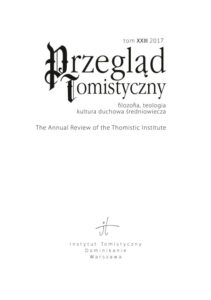JACEK WOJTYSIAK, Aquinas’s Scientia Divina

Volume XXIII: 2017
Philosophy — Theology— Spiritual Culture of the Middle Ages
ISSN 0860-0015
e-ISSN 2544-1000
SUMMARY
The present article was my attempt to present the natural theology (scientia divina) of St Thomas Aquinas in a more analytical and metaphilosophical way. The collected material allows us to distinguish Aquinas’s two approaches, categorical and beyond-categorical, both in the demonstration of God’s existence and the procedure for establishing His attributes. This distinction becomes apparent in the five ways. I interpreted the first, second and fifth as simple modifications of Aristotle, whereas the third and the fourth represented, to me, original conceptual speculation. The speculation takes us to an interesting concept of God as ipsum esse. This concept, which constitutes an exceptionally mature synthesis of perfect-being theology and creation theology, is greater than the concepts of his predecessors and can be used as a tool for expressing essential elements of the Christian doctrine. The most interesting component of this concept is the idea of God’s simplicity, which requires us to get rid of any categorical-anthropomorphic habit in our way of thinking. According to it, we can state that God is a person, but not in the sense of being such-or-such a person (as some being among other beings), but in the sense of being a mysterious source and principle of existence and perfection of persons.
